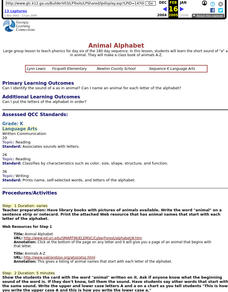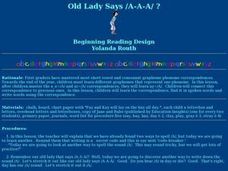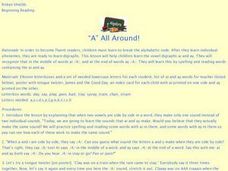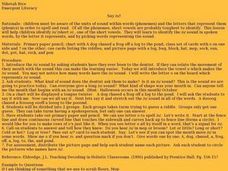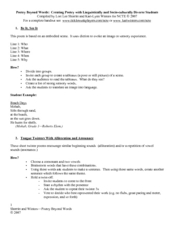Curated OER
Bee a Good Reader
Being able to distinguish between the sounds for short vowel e and long vowel e is an important skill. Young readers are introduced to the /ee/ vowel pattern that makes the long vowel sound. They practice reading and identifying a...
Curated OER
Hop on Pop - Short 'o'
Students practice the alphabetic significance of the letter /o/ along with its awareness of phonemes in spoken words. They assess on construction paper the phrase, "We like to hop on top of Pop who's on top of a hot rock" written on it...
Achieve3000
Discriminating Phonemes 2
Some sounds sound very similar! Help your class learn how to distinguish between various sounds by following the steps outlined in this plan. The plan includes a warm-up, a teacher-led portion, and details for guided and independent...
Meadows Center for Preventing Educational Risk, University of Texas at Austin
Lesson 8 - Open Syllables
Just like scholars plug something in to close a circuit, they must plug a consonant onto a word to make closed syllables. Help learners distinguish between open and closed syllables with a series of activities that emphasize open...
Curated OER
Beginning and Ending Sounds - Lesson 1 of 2
Stamp, slap, and clap! Emergent readers demonstrate their awareness of the initial, medial vowel, and final sounds in spoken, short vowel, single-syllable words with a stamp/slap/clap activity. After identifying the letters and sounds of...
Curated OER
Spark Students Interest in Fire Safety Week
Students explore and analyze about Fire Safety Week. They assess what a fire is, how is spreads so fast, , that it is hot and dark. Each student becomes aware that fire related incidents is the number three cause of death for children in...
Curated OER
Sounding Out CVCE Words
First graders explore vowels and consonants by participating in a flash card activity. In this phonetics instructional activity, 1st graders discuss the difference between short and long vowels and identify them within a story told to...
Curated OER
Under the Umbrella
Young scholars complete a variety of activities related to the short /u/ sound. As a class they recite a tongue twister, then trace and write the letter U. Students then listen to a list of words and identify the words containing the...
Curated OER
Animal Alphabet
Students make a class animal book using the letters of the alphabet. They use a website imbedded in this plan to get pages with animals that begin with any of the 26 letters.
Curated OER
THE BLENDING SLIDE
Your beginning readers will practice blending sounds with this hands-on activity! Each learner gets their own paper slide, cards with consonants, and cards with vowels. Then, after practicing as a class, they can blend consonant and...
Curated OER
Beat the Heat
Review common digraphs with your early elementary schoolers. They identify the digraph /ea/ in written and spoken language. After a brief discussion, they apply the rule for identifying and spelling words containing the /ea/ digraph....
Curated OER
Old Ladies Say A?
The letter a produces so many sounds! Increase your class's awareness of concepts related to reading and spelling. They identify the digraphs /ea/ and /ai/ in spoken language and spelling as a long vowel sound. After a brief discussion,...
Curated OER
Open Up And Say Ahh
Who has a word that has an /o/? Teach kids this fun song (sung to the tune of "Skip to My Lou") to remember the /o/ sound and words that contain the target sound. Then have learners identify the sound in various words before reading In...
Curated OER
Reading Bugs
Review the phonemic sounds of the alphabet letters before examining how to blend letter sounds to make a word. During this teacher-modeled lesson, learners make word bugs out of three phonemes that blend together. As an assessment, read...
Curated OER
Short I/Short U Name the Picture
In this short vowel name the picture worksheet, students will choose a short I or short U word from the word bank to correctly name the picture. Then students will draw a picture of a kid on the bus.
Curated OER
Peg and Hen
Learners navigate a website to practice the short e sound. In this short e sound lesson, students read a story on Starfall and complete practice with the short e sound.
Curated OER
Reintroduce an Irregular Word
Students explore language arts by participating in a pronunciation activity. In this irregular word lesson, students must identify irregular words used in class and pronounce them when their teacher refers to one in class. Students...
Curated OER
Word Recognition
Young scholars recognize and spell color and shape words. In this color and shape words lesson plan, students reinforce their vocabulary and spelling skills.
Curated OER
Combining Syllables to Form 2- and 3-Syllable Words
Students practice combining consonant-vowel-consonant sounds to form words. They read closed and silent "e" syllables. Students construct two-syllable words. They arrange syllables to form three and four syllable words.
Curated OER
"A" All Around
Spell and read words containing ai and ay. First and second graders identify vowel digraphs in written and spoken language. After a brief discussion on the combinations of letters that comprise digraphs, they practice reading and...
Curated OER
Say /o/
Ollie the octopus is occupied! Use this tongue twister to help youngsters learn the /o/ sound. After practicing the target sound, learners should print the letter. When they are familiar with the letter and its sound, the group will...
Curated OER
Say Aaaah
Using letter boxes and a series of activities, young learners will identify the /o/ sound. Give them the fun tongue twister before having them manipulate letters in the letter box, and then read In the Big Top. Can your learners find the...
Curated OER
Poetry Beyond Words: Creating Poetry with Linguistically Diverse Students
Models of and directions for how to write 20 different types of poems are featured in an NCTE resource. The introduction to each form highlights the embedded concepts. For example, tongue twisters encourage poets to use alliteration and...
Curated OER
Ouch! I have a booboo
First graders recognize the short vowel o in written and spoken language. Through matching activities, they discriminate the short vowel /u/ spelled ou from the short vowel /u/ spelled u. Students associate the phoneme with its letter...










